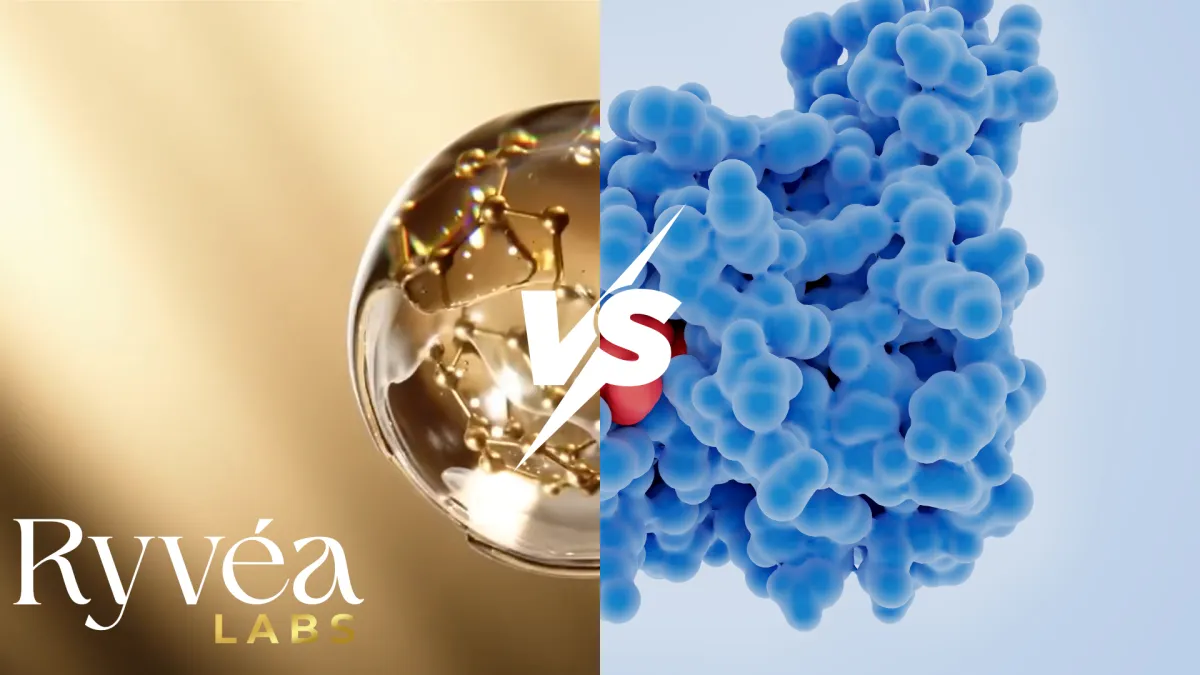
Peptides vs. Proteins: What’s the Difference and Why It Matters
Peptides vs. Proteins: What’s the Difference and Why It Matters
“Peptides are fragments of proteins, and their smaller size allows them to target cellular functions with greater precision.”
Disclaimer: This is a publicly sourced quote, used for educational context only. (Dr. Rhonda Patrick)

Introduction
You’ve probably heard the terms peptides and proteins used side by side—especially when it comes to fitness, skincare, or supplements. But are they the same thing? And if not, does the difference really matter?
In this guide, we’ll break it down clearly and simply: what separates peptides from proteins, how they interact in the body, and why understanding this distinction can help you make smarter health choices.
What Are Proteins?
Proteins are large, complex molecules made up of hundreds or even thousands of amino acids. They fold into intricate shapes and are responsible for many major biological functions, including:
Building muscle and tissue
Repairing cells
Supporting immune defense
Producing enzymes and hormones
Proteins are essential to life, and we get them through food sources like meat, eggs, beans, and dairy.
For a primer on how proteins function in biology, visit:
NIH – What Are Proteins and What Do They Do?
What Are Peptides?
Peptides are short chains of amino acids, typically made up of 2 to 50 units. They are essentially fragments of proteins, and their smaller size allows them to act as precise “messengers” in the body.
Here’s what peptides may influence:
Growth hormone release
Skin regeneration
Inflammation response
Brain function
Tissue repair
Some peptides occur naturally in food, while others are created synthetically for research or therapeutic use.
To explore peptide science in more depth:
Wikipedia – Peptide
Key Differences Between Peptides and Proteins
The main differences come down to size, structure, and function:
Size: Peptides are made up of just 2 to 50 amino acids. Proteins are much larger—often containing hundreds or thousands.
Structure: Peptides are short chains, while proteins fold into complex, three-dimensional shapes.
Function: Peptides often act as messengers, sending signals to specific parts of the body. Proteins serve broader roles, like building tissues, forming enzymes, and supporting immune function.
Absorption: Because they’re smaller, peptides may be absorbed more quickly. Some can even penetrate the skin, which proteins usually cannot.
Use Cases: Peptides are commonly found in skincare, research, and athletic performance supplements. Proteins are better known for their role in building muscle, supporting metabolism, and fueling recovery.
In short: proteins are like the building blocks of your body, while peptides are like the instructions that tell your body what to do.
Why Does This Matter?
1. Functionality
If you’re taking a protein powder, you’re fueling your body with raw materials for muscle growth and repair. If you’re using a peptide, you’re sending a specific signal to activate or regulate a particular biological function—like increasing collagen or boosting recovery.
2. Absorption and Application
Peptides may be absorbed more quickly due to their small size. Some topical skincare peptides are designed to reach deeper skin layers—a feat that full proteins can’t typically achieve.
3. Precision vs. Bulk
Proteins are like construction bricks. Peptides are like text messages directing the building crew. One offers structure; the other provides instruction.
Are Peptides and Proteins Regulated the Same Way?
No. Here's the legal breakdown:
Proteins (like whey or collagen powder) are classified as food or dietary supplements.
Peptides, especially those made synthetically, often fall under drug regulations—especially if injected or sold for specific biological effects.
Many peptides are sold as “research-only” compounds, not for human consumption, to avoid FDA scrutiny.
You can read more on FDA classification of peptides here:
FDA – Evaluating Peptide Drug Products
How to Know What You’re Taking
Before buying any supplement or injectable:
Read the label carefully: Is it a protein supplement or a peptide product?
Check for disclaimers: “For research use only” means it’s not approved for human use.
Ask about sourcing: High-quality suppliers should be transparent about testing, purity, and intended use.
Ryvéa Safety Page
View 99%+ Purity Peptides
Conclusion – Understanding the Distinction
Both peptides and proteins play vital roles in the body—but they are not interchangeable. Peptides are fast-acting, targeted messengers, while proteins are foundational building blocks. Knowing the difference can help you choose the right tool for your health goals.
Looking to explore safe, science-backed peptide education and products?
Free Peptides 101 Ebook
Final Thoughts
If you're navigating the world of wellness, skincare, or biohacking, understanding peptides vs. proteins is essential. At Ryvéa Labs, we aim to clarify complex science in a way that’s trustworthy, digestible, and FDA-conscious—so you can feel confident about what you're putting in (or on) your body.
